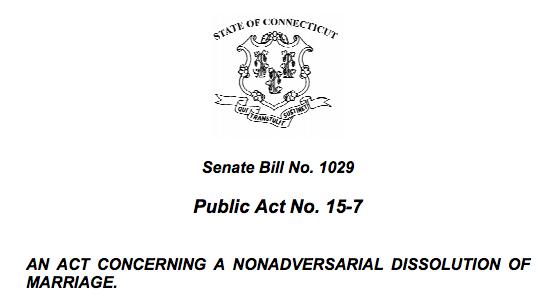Connecticut Mediated and Collaborative Divorces Gain Benefit Under New Law

 Quite a bit of attention has been paid to the new law effective October 1, more formally known as Public Act No. 15-7, allowing faster and less expensive divorces for spouses who choose to have a non-adversarial divorce. Until this law was effective, all Connecticut couples dissolving their marriages, even those who had reached an agreement, were (1) subject to a 90 day waiting period before they could divorce and (2) needed to appear in court at least one time in order to divorce. The focus of most media attention has been on the parts of the new law that allow couples who have reached an agreement and who meet certain rigorous requirements — including a marriage of less than 8 years, no children, and less than $35,000 in property — to divorce without ever appearing in court and without waiting 90 days.
Quite a bit of attention has been paid to the new law effective October 1, more formally known as Public Act No. 15-7, allowing faster and less expensive divorces for spouses who choose to have a non-adversarial divorce. Until this law was effective, all Connecticut couples dissolving their marriages, even those who had reached an agreement, were (1) subject to a 90 day waiting period before they could divorce and (2) needed to appear in court at least one time in order to divorce. The focus of most media attention has been on the parts of the new law that allow couples who have reached an agreement and who meet certain rigorous requirements — including a marriage of less than 8 years, no children, and less than $35,000 in property — to divorce without ever appearing in court and without waiting 90 days.
Although this is progress for some Connecticut spouses, significantly more couples can choose to take advantage of the less-discussed new process contained in Section 5 of Public Act No. 15-7, which modifies Connecticut General Statutes § 46b-67.
Specifically, effective October 1, C.G.S.A. § 46b-67(b) now reads:
If the parties attest, under oath, that they have an agreement as to all terms of the dissolution of marriage or legal separation and wish the court to enter a decree of dissolution of marriage or legal separation prior to the expiration of the time periods set forth in subsection (a) of this section, and file a motion seeking the waiver of said time periods, the court may waive the provisions of subsection (a) of this section.
What this all means is that all divorcing Connecticut couples who reach an agreement — regardless of their income or children or assets — can move the court to waive the 90-day statutory waiting period.
This is of particular benefit to couples who have chosen to have a mediated or collaborative divorce. As the divorce mediator, Freed Marcroft’s lawyers serve as the neutral third party who facilitates the discussion between the divorcing couple. We assist the spouses in reaching an amicable agreement with respect to all issues involved in a separation or divorce including custody and parenting, property division, child support, and alimony.
Even prior to the passage of this law, mediated Connecticut divorces were shown to be more cost effective, less stressful, and faster than litigated divorces. Now, there is the added benefit in that once spouses are ready to move forward and have reached an agreement, with the court’s permission they no longer need to wait before they can become unmarried.
If you would like to learn more about this new law, mediation, or collaborative divorce, please contact us.








